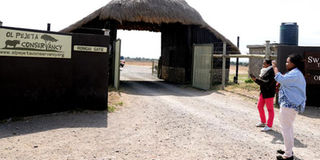Stop hate campaign against conservancies

Visitors take establishment shots of Ol Pejeta Conservancy in Laikipia County on August 5, 2014. Conservancies operate within the law. PHOTO | SALATON NJAU | NATION MEDIA GROUP
What you need to know:
- Conservancies are legal enterprises making a very important contribution to the economy through tourism.
- Studies show that combined incomes from land leases and employment are much better than peasant farming or pastoralism.
Drought has occasioned an unprecedented hate campaign against wildlife conservancies.
Because they harbour wildlife and some are owned by white people and host tourist enterprises, they are easy targets of emotional rhetoric, depicting them as illegal and foreign.
Recently, columnist Rasna Warah ascribed the crisis in Laikipia County to historical injustices meted on local people.
It was puzzling and disturbing coming from a good columnist who always advocates racial and cultural diversity.
Conservancies are legal enterprises making a very important contribution to the economy through tourism and conservation of wildlife.
The biggest conservation challenge today is lack of space as the land set aside for it is very small.
So, if the country desires to conserve the heritage, land has to be created outside national parks.
But this can only happen if there is an economic incentive because it’s private land where owners have other use options.
Wildlife on private land can only be tolerated if it has economic value, which can only come from an activity compatible with conservation.
That is the nexus between conservancies and tourism.
ENCOURAGE INVESTORS
The people in these businesses are genuine investors who see the potential, have the capital to put up facilities and have the ingenuity to look for markets.
They engage local people and enter into legal leases to use their lands for wildlife, which attracts visitors who bring income to underwrite cost of leasing the land and other operations.
Conservancies make an important contribution to the conservation of wildlife on private land.
They generate income and employ many people. Studies show that combined incomes from land leases and employment are much better than peasant farming or pastoralism.
Unfortunately, we condemn these people, instead of aspiring to be a modern nation that relishes diversity by ensuring peace, safety and the prosperity of all.
Economies grow and prosper because of people who see rare opportunities where the majority cannot.
We should, in fact, encourage people from all over the world to open up our idle lands; mountain cliffs, deserts and forests to explore business opportunities.
It’s very simplistic when we disparage such people over spurious nationalism.
Conservancies operate within the law. They are all registered by the government and work in conjunction with Kenya Wildlife Service and their activities and management plans are approved and periodically reviewed by the National Environment Management Authority.
It is easy to demonise something because you hate the people behind it. It’s quite different to provide a solution.
ANCESTRAL LAND
Those with alternative ideas should initiate them rather than wage a hate campaign against these organisations.
Conservation is expensive and the government is too overwhelmed managing national parks, a majority of which do not generate revenue.
Indeed, the KWS can hardly sustain itself without donors. It’s not any easier for private conservation and that’s why institutions like Northern Rangelands Trust seek donor funding to supplement revenue from tourism, which has had a prolonged downturn.
Lastly, it is sad to justify illegal invasions and destruction of private property as a quest for ancestral land.
Where would this argument of ancestral land end if we were to stretch it to the end? Who would be spared?
With due respect to pastoral communities, we must all appreciate that the world has changed; climate, land size, cultures, economies, and so on, and there is no turning back.
The pastoralists also cannot sustainably manage huge herds of livestock as they did decades ago and we must not deceive them that there is a solution in invading other people’s lands and property. Even that cannot be sustained.
Mr Njaga is a travel consultant. [email protected]




